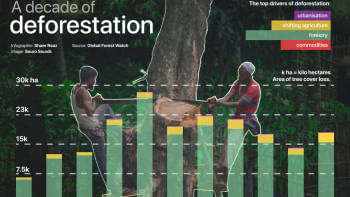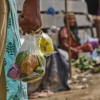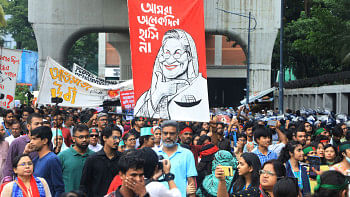A future without farmland?

We are alarmed that around 270 square kilometres of land in the country—roughly the size of Dhaka city—is losing fertility every year, posing a serious threat to the nation's food security. A recent study by the Soil Resource Development Institute (SRDI) found that 76.2 percent of the land in Bangladesh suffers from moderate to very severe soil degradation. This translates to a staggering 1.124 crore hectares of degraded land, an increase from the 1.07 crore hectares estimated in 2000.
The reasons behind soil degradation in Bangladesh are complex and interconnected. To begin with, there is the overuse of chemical fertilisers, which boosts crop yields in the short term, but their long-term use depletes essential soil nutrients and organic matter. In the coastal areas, rising salinity levels due to climate change and shrimp farming have further disrupted the natural balance of salts in the soil, making it unsuitable to grow most crops. Industrial pollution from factories, deforestation and the improper disposal of electronic and medical waste are additional factors accelerating soil degradation. Trees play a vital role in maintaining soil health by preventing erosion and regulating water flow, so when forests are cleared, the soil becomes more vulnerable to erosion and degradation.
Degradation of soil fertility reduces crop yields, diminishes the nutritional value of crops, and increases vulnerability to droughts and floods. This not only impacts food security, but also harms the environment and livelihoods of millions of Bangladeshis. Unless immediate action is taken, our country could face a future with no cultivable land within the next 63 years, according to experts. This is no doubt a frightening prospect for a nation of 17 crore people who are still heavily reliant on agriculture.
But is the government aware of the severity of the issue? It needs to play an urgent role in reversing soil degradation by phasing out profitable but harmful industries, such as tobacco and shrimp farming, which are causing irreparable damage to scarce agricultural land. It should invest in research and development of sustainable agricultural technologies and encourage farmers to adopt green agricultural practices—such as crop rotation, cover cropping, and composting—to improve soil health and fertility. Finally, the government must implement strict policies to limit industrial pollution and harmful waste disposal practices, and put an end to our destructive spree of deforestation around the country.


 For all latest news, follow The Daily Star's Google News channel.
For all latest news, follow The Daily Star's Google News channel. 










Comments